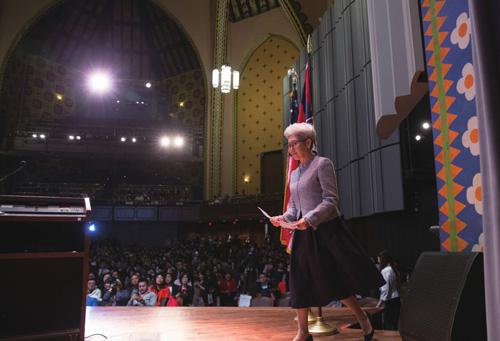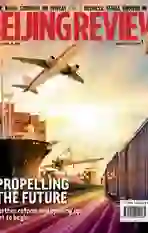NEW SCRIPT NEEDED
2018-05-09
In a speech at the Penn Wharton China Summit 2018, an event at the Wharton School of the University of Pennsylvania, in Philadelphia on April 14, Fu Ying, a veteran diplomat and Vice Chair of the Foreign Affairs Committee of the National Peoples Congress, called for a better understanding of Chinas development. An edited excerpt follows:
This year marks the 40th anniversary of reform and opening up in China. The China-U.S. relationship has witnessed profound change in this period. Today, more than 300,000 students from Chinas mainland are studying at U.S. universities, and nearly 3 million Chinese tourists travel to the United States every year. The two countries have become important partners in many areas and both have benefited from mutual cooperation.
However, the relationship is not without difficulties. The United States has become increasingly concerned about China, defining China as a strategic competitor which, presumably, challenges U.S. interests and influence and erodes its security and prosperity. Recently the United States has threatened tough trade measures against China, putting more strain on the relationship.
But where does the U.S. administration want to take our relations?
After the end of the Cold War, the United States continued to overstretch its military might for ideological, economic and security purposes, which hasnt produced its intended result. Apparently, it is now considering strategic retrenchment.
When the United States started the Iraq War in 2003, Chinas GDP was only one ninth that of the United States. Some 10 years later, with the beginning of the U.S. withdrawal, Chinas GDP grew to half, turning it into the second largest economy in the world. Should the current trajectory continue, it will only be a matter of time before China catches up to the United States. This prospect has deeply worried some in the United States.
China is now getting closer to the worlds center stage which has never been empty. For centuries, different shows with the same old script have been performed there. The challenge for China is how to find its proper role.
Lessons from history
The old script is mostly about power struggles, which have not left humankind with good memories. From the self-destructive Peloponnesian War in ancient times to the two devastating world wars in the 20th century, such power struggles have been staged again and again.
According to the old script, some in the United States have started to see China as a rival and a threat. Thucydides warned that what made war inevitable was the growth of Athenian power and the fear which this caused in Sparta. Are we feeling the gravitational force of the Thucydides Trap once again?
Not on the part of China, at least. With a sense of equanimity, we are convinced that China-U.S. cooperation is in the fundamental interest of both countries and conducive to world peace and development.
Those who try to make forecasts about China need to note that the Chinese have a rich experience and knowledge of war and peace. For example, when the Peloponnesian War was unfolding 2,400 years ago, China was in the Spring and Autumn and Warring States periods(770-221 B.C.), with feudal lords vying for power.
Like in ancient Greece, China was witnessing huge social transformation driven by revolutionary new ideas and innovation. It saw the rise of intellectual excellence including Confucianism, Taoism and Legalism. German philosopher Karl Jaspers included this period in the Axial Age, which refers to the stage in history when the foundations that underlie modern civilizations came into being.
Civilizations leave their mark on humankind, and the heritage of Chinese civilization lies in treasuring peace and stability, instead of the inevitability of power struggles. For example, Confucius said that “peace is precious,” calling for exercising caution before waging war. Confucian philosopher Mencius said that “a just cause attracts a lot of support, while an unjust one finds little.” Even Sun Tzu, the great military strategist, believed that “the supreme art of war is to subdue the enemy without fighting.”
Peace and prosperity have always been the goal of the Chinese nation. In todays China, for example, the strategic thinking is defensive in nature, which also has its roots in our traditions.
However, we Chinese have a bitter memory of modern history. For over a century China suffered the humiliation of foreign aggression. It was a harsh lesson and the nation is now determined to have a strong defense so that this painful history doesnt repeat itself. Peace needs to be defended with adequate capabilities.
An uphill journey
The 19th National Congress of the Communist Party of China held in October 2017 drew an important conclusion that socialism with Chinese characteristics has entered a new era. Thanks to the leadership of the Party and the hard work of the Chinese people, China has achieved marked success, and in the new era, we are getting closer to realizing the Chinese dream.

However, China is still on an uphill journey of modernization and faces tough challenges. For example, we need to lift the remaining 30 million people out of poverty in the coming three years. Addressing environmental degradation is also an urgent job, as is the need to improve governance through strengthening the rule of law and fighting corruption. The list is long, and for a relatively extended period of time, China must focus on its domestic development with the goal of helping every family and every individual to achieve a decent life.
To reach its development objectives, China needs a peaceful external environment. We are increasingly aware of the responsibility we need to shoulder on the world stage and the expectations and concerns of the world. We need to communicate our views and intentions in a prompt and convincing manner, so that the world can better understand us.
At the Boao Forum for Asia Annual Conference which I just attended, President Xi Jinping delivered a very important speech. He made it clear to the world that Chinas door of opening up will not be closed and will only open wider. China will adopt critical measures to pursue further opening up, including significantly broadening market access, creating a more attractive investment environment, strengthening the protection of intellectual property rights and taking the initiative to expand imports. In short, China will enter a new phase of opening up.
These policies and measures also provide inspiration for addressing the challenges in China-U.S. relations. China and the United States have been important partners for many years. It is in the interest of both sides to maintain this partnership and find mutually acceptable solutions to differences. We stand to gain from working together. We will both lose should we enter into confrontation, be it over trade or any other matter.
President Xi has put forward the vision of building a community with a shared future for mankind. We hope it offers a good option for the 21st century.
The world needs a new script. The new generation should be able to go beyond the traditional mindset of power politics and take a fresh approach. After all, young people are the ones who will write the history of tomorrow and will make the future even brighter.
